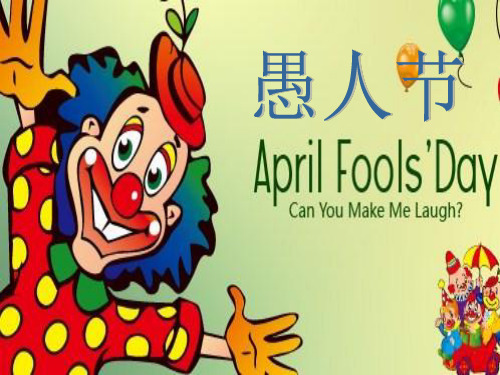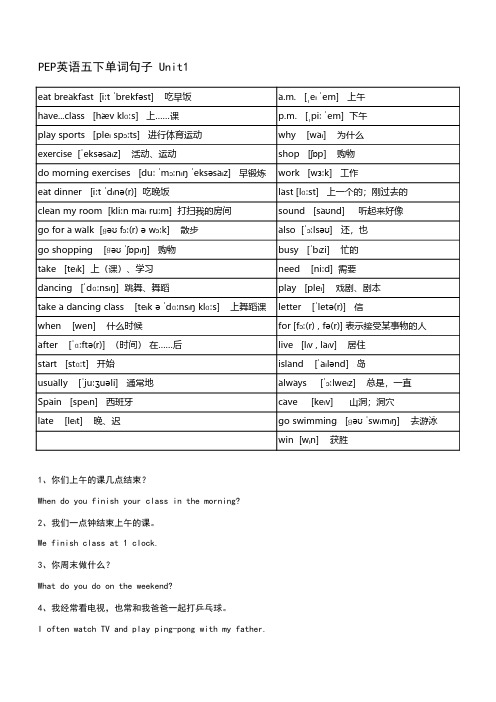Unit 1-2 SP April Fool's Day
April fool's day愚人节快乐

origin
• Other people would then be playing tricks on their giving them false gift, and invited them to false celebration, leading them to run errands, or make them to a nonexistent things done. These mark called “April fool”.
celebration
• Now this festival also began in our Chinese popular, especially among the college students. Consequently, April fool‘s day is not only westerners thing, also influence to the east.
• In sixteenth-century France, on April 1, people celebrate New Year's day, exchanging gifts, have a party to celebrate. Then celebrate method and yielding around now.
origin
origin
• Every year, the French king Charlie 1582 nine world decided to adopt a new calendar - Craig Gregory calendar, New Year's day to change in January 1st. In the new calendar implementation of process, there are still some people around or is not willing to accept the new calendar, or don't know this date changes, still in the April 1 day to spend the New Year.
新概念二册-第76课April Fool's Day(共40张PPT)

Two of the leading growers in the area.
6. What have they been expecting this year? A splendid crop.
• It was warm last Sunday, so I went and sat on the river bank as usual.
• as usual“像平常一样”、“照例” • 既可以作定语,又可以作表语
• It is usual for him to sit up late at night.
• In the present situation/case • 在当前形势/情况下 • 目前我们没有进一步消息
• We do not have any more information at the present time
• 2) 出席 present at • 只有少数人出席会议
• Only a few people were present at the meeting.
目的状语
表示“为了,以便”的目的状语从句可以由that, so that, in order that等词引导。
You must speak louder so that /in order that you can be heard by all.
当从句主语与主句主语相同时, 可用(in order) to或 so as to短语取代该目的状语从句。
• rain n. 当rain指“雨季”、“季节性的 雨”,尤其是热带地区的雨季时,要用复 数形式:
五年级下册单词表英语

五年级下册单词表英语Unit 1.eat breakfast /iːt ˈbrekfəst/ 动词短语吃早饭。
have...class /hæv...klɑːs/ 动词短语上……课。
play sports /pleɪ spɔːts/ 动词短语进行体育运动。
exercise /ˈeksəsaɪz/ 动词,名词活动;运动;锻炼。
do morning exercises /duːˈmɔːnɪŋˈeksəsaɪzɪz/ 动词短语做早操。
eat dinner /iːt ˈdɪnə(r)/ 动词短语吃晚饭。
clean my room /kliːn maɪ ruːm/ 动词短语打扫我的房间。
go for a walk /ɡəʊ fɔː(r) ə wɔːk/ 动词短语散步。
go shopping /ɡəʊˈʃɒpɪŋ/ 动词短语去买东西;购物。
take /teɪk/ 动词学习;上(课)dancing /ˈdɑːnsɪŋ/ 名词跳舞;舞蹈。
take a dancing class /teɪk əˈdɑːnsɪŋ klɑːs/ 动词短语上舞蹈课。
Unit 2.spring /sprɪŋ/ 名词春天。
summer /ˈsʌmə(r)/ 名词夏天。
autumn /ˈɔːtəm/ 名词秋天。
winter /ˈwɪntə(r)/ 名词冬天。
season /ˈsiːzn/ 名词季节。
picnic /ˈpɪknɪk/ 名词野餐。
go on a picnic /ɡəʊɒn əˈpɪknɪk/ 动词短语去野餐。
pick /pɪk/ 动词摘;采集。
pick apples /pɪk ˈæplz/ 动词短语摘苹果。
snowman /ˈsnəʊmæn/ 名词雪人。
make a snowman /meɪk əˈsnəʊmæn/ 动词短语堆雪人。
which /wɪtʃ/ 疑问代词哪一个。
best /best/ 副词最;最高程度地。
april fool's day

April Fool’s day is a day when people play jokes on each other. On this day you will often see strange and interesting finds, scientific results that are put there to mislead the public.
• 在美国,人们会在四月的第一天跟朋友们以及 其他人开小玩笑。他们可能会指着你的鞋子然 后说:”你鞋带散了。"如果你相信了然后低 头去看,那么你就是被耍了。 ︿( ̄︶ ̄)︿
• In England, tricks can be played only in the morning. If a trick is played on you, you are a "noodle". • 在英格兰,这些恶作剧只能在早上进行, 如果你不幸中招了的话,你就是那个傻瓜 啦 <( ̄ˇ ̄)/
Each country celebrates April Fool's differently.
• In America,people play small jokes on their friends and any other people on the first of April.They may point down to your shoe and say,"Your shoelace is untied."If you believe them and look down to see,you are an April Fool then.
新概念第二册-Lesson 76 April Fools' Day

SPLENDID
splendid /ˈsplendɪd/ adj. 极好的 (同) excellent /ˈeksələnt/ adj. 极好的, 杰出的 wonderful /ˈwʌndəfl/ adj. 精彩的, 绝妙的 fabulous /ˈfæbjələs/ adj. 精彩的, 绝妙的 E.g. Two of the leading growers, Giuseppe Moldova and Riccardo Brabante, tell me that they have been expecting a splendid crop this year and harvesting has begun earlier than usual. 两个主要种植者,朱塞皮.莫尔道瓦和里卡多.布拉班特告诉我,他们一直 期待着今年获得一个大丰收,收割工作比往年开始要早些。
SIGNOR
Signor /'siːnjɔː/ n.(意大利语)先生
present /ˈprez(ə)nt/ n. 目前, 礼物 adj. 目前的, 出席 /prɪˈzent/ v. 提出, 展示 at present 现在 E.g. "Are you busy?" "Not at present." “你忙吗?”“目前不忙。” - Cambridge Dictionary
ห้องสมุดไป่ตู้
GATHER
gather /ˈɡæðə(r)/ v. 聚集, 收庄稼 together /təˈɡeðə(r)/ adv. 一起,共同 词根词缀: to-朝 , 向 + gether (gather) 聚集, 聚拢
thresh /θreʃ/ v. 打(庄稼) E.g. The whole village has been working day and night gathering and threshing this year's crop before the September rains. 村的人都日夜奋战,要赶在9月的雨季之前把今年的 庄稼收获上来,打完场。
五年级英语下册单词表完整版

五年级英语下册单词表完整版人教版五年级英语下册单词表。
Unit 1.1. eat breakfast [iːt ˈbrekfəst]:动宾短语,吃早饭。
2. have…class [hæv klɑːs]:动宾短语,上……课。
3. play sports [pleɪ spɔːts]:动宾短语,进行体育运动。
4. exercise [ˈeksəsaɪz]:n. 活动;运动;练习;v. 锻炼。
5. do morning exercises [duːˈmɔːnɪŋˈeksəsaɪzɪz]:做早操。
6. eat dinner [iːt ˈdɪnə(r)]:吃晚饭。
7. clean my room [kliːn maɪ ruːm]:打扫我的房间。
8. go for a walk [ɡəʊ fɔː(r) ə wɔːk]:散步。
9. go shopping [ɡəʊˈʃɒpɪŋ]:去买东西;购物。
10. take [teɪk]:v. 拿;取;学习;花费(时间)11. take a dancing class [teɪk əˈdɑːnsɪŋ klɑːs]:上舞蹈课。
12. when [wen]:adv. 什么时候;何时。
13. after [ˈɑːftə(r)]:prep. & conj. 在(时间)后。
14. start [stɑːt]:v. 开始。
15. usually [ˈjuːʒuəli]:adv. 通常地;惯常地。
16. Spain [speɪn]:n. 西班牙。
17. late [leɪt]:adj. 晚;迟。
Unit 2.1. spring [sprɪŋ]:n. 春天。
2. summer [ˈsʌmə(r)]:n. 夏天。
3. fall [fɔːl]:n. 秋天;落下;跌倒(美语,fall = 英式英语的autumn)4. winter [ˈwɪntə(r)]:n. 冬天。
5. season [ˈsiːzn]:n. 季节。
2024年五年级下册英语单词表

2024年五年级下册英语单词表Unit 1.- day [deɪ] (n.) 天;日。
- week [wiːk] (n.) 星期。
- Monday ['mʌndeɪ] (n.) 星期一。
- Tuesday ['tjuːzdeɪ] (n.) 星期二。
- Wednesday ['wenzdeɪ] (n.) 星期三。
- Thursday ['θɜːzdeɪ] (n.) 星期四。
- Friday ['fraɪdeɪ] (n.) 星期五。
- Saturday ['sætədeɪ] (n.) 星期六。
- Sunday ['sʌndeɪ] (n.) 星期日。
- weekend [ˌwiːkˈend] (n.) 周末。
- wash [wɒʃ] (v.) 洗。
- wash my clothes [wɒʃ maɪ kləʊðz] 洗我的衣服。
- watch [wɒtʃ] (v.) 看。
- watch TV [wɒtʃˌtiːˈviː] 看电视。
- do [duː] (v.) 做;干;助动词(无词义)- do homework [duːˈhəʊmwɜːk] 做家庭作业。
- read [riːd] (v.) 看;读。
- read books [riː d bʊks] 看书。
- play [pleɪ] (v.) 踢;玩;参加(体育运动)- play football [pleɪˈfʊtbɔːl] 踢足球。
Unit 2.- spring [sprɪŋ] (n.) 春天。
- summer ['sʌmə(r)] (n.) 夏天。
- autumn ['ɔːtəm] (n.) 秋天。
- winter ['wɪntə(r)] (n.) 冬天。
- season ['siːzn] (n.) 季节。
- picnic ['pɪknɪk] (n.) 野餐。
PEP小学英语单词句子-背记版(五下)

PEP英语五下单词句子 Unit1eat breakfast [iːt ˈbrekfəst] 吃早饭 a.m. [ˌeɪˈem] 上午have...class [hæv klɑːs] 上……课p.m. [ˌpiːˈem] 下午play sports [pleɪ spɔːts] 进行体育运动why [waɪ] 为什么exercise [ˈeksəsaɪz] 活动、运动shop [ʃɒp] 购物do morning exercises [duːˈmɔːnɪŋ ˈeksəsaɪz] 早锻炼work [wɜːk] 工作eat dinner [iːt ˈdɪnə(r)] 吃晚饭last [lɑːst] 上一个的;刚过去的clean my room [kliːn maɪ ruːm] 打扫我的房间sound [saʊnd] 听起来好像go for a walk [ɡəʊ fɔː(r) ə wɔːk] 散步also [ˈɔːlsəʊ] 还,也go shopping [ɡəʊˈʃɒpɪŋ] 购物busy [ˈbɪzi] 忙的take [teɪk] 上(课)、学习need [niːd] 需要dancing [ˈdɑːnsɪŋ] 跳舞、舞蹈play [pleɪ] 戏剧、剧本take a dancing class [teɪk əˈdɑːnsɪŋ klɑːs] 上舞蹈课letter [ˈletə(r)] 信when [wen] 什么时候for [fɔː(r) , fə(r)] 表示接受某事物的人after [ˈɑːftə(r)] (时间) 在……后live [lɪv , laɪv] 居住start [stɑːt] 开始island [ˈaɪlənd] 岛usually [ˈjuːʒuəli] 通常地always [ˈɔːlweɪz] 总是,一直Spain [speɪn] 西班牙cave [keɪv] 山洞;洞穴late [leɪt] 晚、迟go swimming [ɡəʊˈswɪmɪŋ] 去游泳win [wɪn] 获胜1、你们上午的课几点结束?When do you finish your class in the morning?2、我们一点钟结束上午的课。
- 1、下载文档前请自行甄别文档内容的完整性,平台不提供额外的编辑、内容补充、找答案等附加服务。
- 2、"仅部分预览"的文档,不可在线预览部分如存在完整性等问题,可反馈申请退款(可完整预览的文档不适用该条件!)。
- 3、如文档侵犯您的权益,请联系客服反馈,我们会尽快为您处理(人工客服工作时间:9:00-18:30)。
April Fool's DayUnlike most of the other nonfoolish holidays, the history of April Fool's Day, sometimes called All Fool's Day, is not totally clear. It is not like Halloween, where despite an interesting history, most people just put on Halloween costumes, get candy, and leave it at that. There really wasn't a "first April Fool's Day" that can be pinpointed on the calendar. Some believe it sort of evolved simultaneously in several cultures at the same time, from celebrations involving the first day of spring.The closest point in time that can be identified as the beginning of this tradition was in 1582, in France. Prior to that year, the new year was celebrated for eight days, beginning on March 25. The celebration culminated on April 1. With the reform of the calendar under Charles IX, the Gregorian Calendar was introduced, and New Year's Day was moved to January 1.However, communications being what they were in the days when news traveled by foot, many people did not receive the news for several years. Others, the more obstinate crowd, refused to accept the new calendar and continued to celebrate the new year on April 1. These backward folk were labeled as "fools" by the general populace. They were subject to some ridicule, and were often sent on "fools errands" or were made the butt of other practical jokes.This harassment evolved, over time, into a tradition of prank-playing on the first day of April. The tradition eventually spread to England and Scotland in the eighteenth century. It was later introduced to the American colonies of both the English and French. April Fool's Day thus developed into an international fun fest, so to speak, with different nationalities specializing in their own brand of humor at the expense of their friends and families.In Scotland, for example, April Fool's Day is actually celebrated for two days. The second day is devoted to pranks involving the posterior region of the body. It is called Taily Day. The origin of the "kick me" sign can be traced to this observance.Mexico's counterpart of April Fool's Day is actually observed on December 28. Originally, the day was a sad remembrance of the slaughter of the innocent children by King Herod. It eventually evolved into a lighter commemoration involving pranks and trickery.Pranks performed on April Fool's Day range from the simple, (such as saying, "Your shoe's untied, or I accidentally stepped on your glasses!), to the elaborate. Setting a roommate's alarm clock back an hour is a common gag. Whatever the prank, the trickster usually ends it by yelling to his victim, "April Fool!"Practical jokes are a common practice on April Fool's Day. Sometimes, elaborate practical jokes are played on friends or relatives that last the entire day. The news media even gets involved. For instance, a British short film once shown on April Fool's Day was a fairly detailed documentaryabout "spaghetti farmers" and how they harvest their crop from the spaghetti trees.April Fool's Day is a "for-fun-only" observance. Nobody is expected to buy gifts or to take their "significant other" out to eat in a fancy restaurant. Nobody gets off work or school. It's simply a fun little holiday, but a holiday on which one must remain forever vigilant, for he may be the next April Fool!Unlike most of the other nonfoolish holidays, the history of April Fool's Day, sometimes called All Fool's Day, is not totally clear. There really wasn't a "first April Fool's Day" that can be pinpointed on the calendar. Some believe it sort of evolved simultaneously in several cultures at the same time, from celebrations involving the first day of spring.不同于大多数别的节日, 愚人节, 有时被称为所有愚人的节日, 它的历史不是完全清楚的。
没有人能够在日历上标明第一个愚人节是什么时候。
一些人相信它是同时从几种文化演变而来的, 从庆祝春天的第一天开始。
The closest point in time that can be identified as the beginning of this tradition was in 1564, in France. Prior to that year, the new year was celebrated for eight days, beginning just after the first day of spring. The celebration typically ended on April 1. With the reform of the calendar under Charles IX, the Gregorian Calendar was introduced, and New Year's Day was moved to January 1.这个传统的历史最早可以追溯到1564 年的法国。
在那年以前, 人们有8 天的时间庆祝新年, 正好从春天的第一天后开始。
庆祝活动通常在4 月1 日结束。
在查理九世在位期间,他进行了历法改革,引进了罗马教皇Gregory的日历,并且新年第一天被移至 1 月 1 日。
